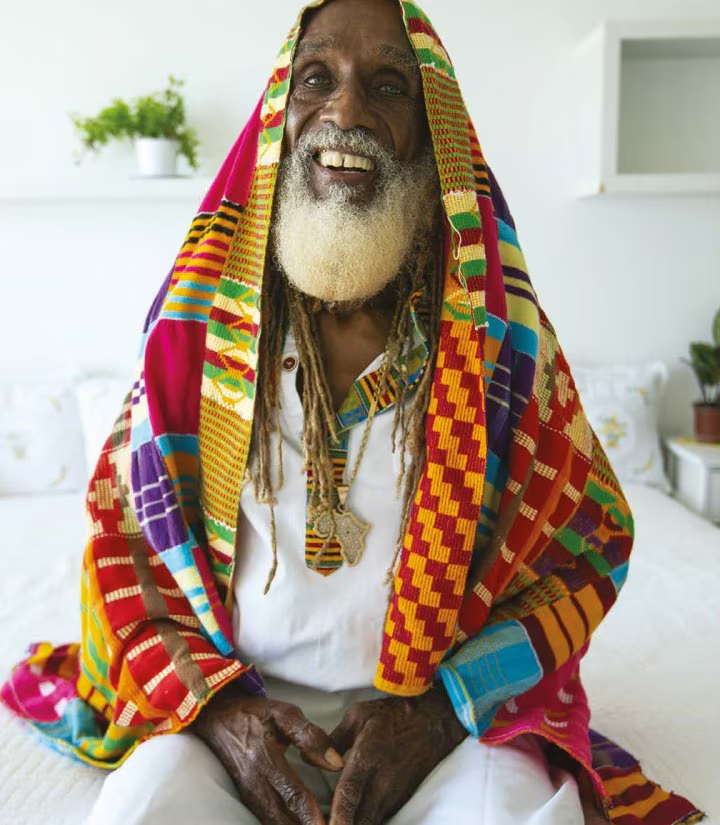When he moved back to Panama City into a new penthouse last year, Aris, at age 74, did not have retirement in mind. With years of knowledge and experience under his belt, he moved with a mission to promote vibrant, ‘sunfired’ food in a place where his ideas could flourish.
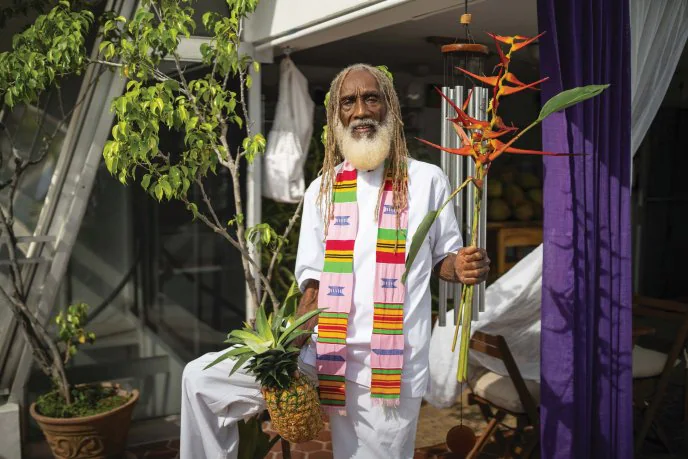
Dr. Aris constantly engages in answering the questions of hungry health-seekers from all corners of the world.
An attraction spot for expats and retirees from all over the world, Panama City is also home to raw food pioneer Dr. Aris LaTham.
Leaving Panama in 1964 as a teenager, he set off around the world on a journey that took him through Central and South America, from New York City’s Harlem neighbourhood to the Caribbean, and finally led him back to his birthplace.
During this time, he accumulated an extensive knowledge of plants, herbs, nutrition, diet, mindfulness, and wellbeing. His memorable catchphrase, “It’s not the food in your life, but the life in your food”, informs his every decision and is testament to his glowing presence and trim physique.
A self-taught culinary innovator, Dr. Aris – who has a PhD in Food Science – has trained thousands of chefs in the principles of harmonic, healthy and ethical food. And now he is home in his native Panama after a 60-year odyssey with no sign of slowing down; continuing to teach at the Sunfired Culinary Institute he founded, filming for SunfiredTV, and hosting retreats at his organic farm.
It’s just past 9am in Panama City and Aris is on the rooftop of his apartment surrounded by an explosion of orange flowers with green leaves the size and shape of shovels. Over 100 years ago, Aris’ grandparents arrived in Panama from Jamaica and Barbados, migrants who worked on building the famous canal linking the Atlantic and Pacific oceans.
“It was a privileged position to be working for the US government,” Aris recalls of his childhood. A cultural melting pot, the region of Colon was settled by over 100,000 islanders from the British and French Caribbean islands. Young Aris, from an English-speaking family, was educated in Spanish, growing up with three cultures at the same time: West Indian, American, and Latin.
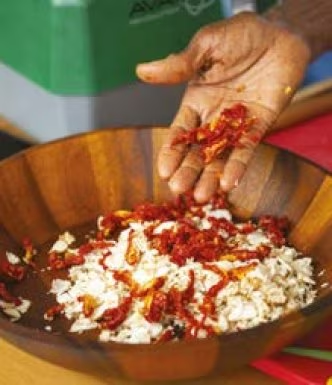
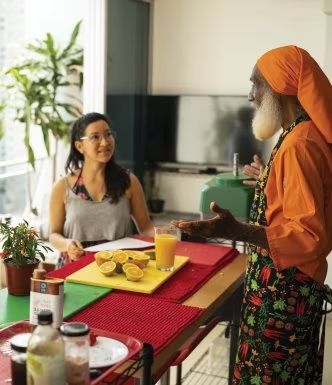
“It’s not the food in your life, but the life in your food”
So how has Panama changed? “It’s definitely a whole lot more. Back then, I was viewing things through the eyes of a teenager. I only knew what was in my neighbourhood. I’d go into the forest to find mangoes and oranges, and knew the basics within that environment.
But now I have this whole world view, flexibility and mobility. With the farm now, and having seen how things are produced in other parts of the world, makes me realise Panama is full of abundance.”
Aris’ penthouse overlooks the bay, just 30 minutes from a jungle brimming with tropical botanical species and wildlife. His ‘city campus’ blends culinary arts with the outdoor elements. Multiple kitchens (without stoves!) follow an open-plan layout, with curious and colourful birds frequent visitors.
There are three kitchens, a study room, four guest bedrooms, a library and small private wing where Aris rests and recharges for the day. Nevertheless, Aris feels less like an inhabitant of his house, and more like an inhabitant of his body, so he doesn’t have much to say when it comes to interiors.
A few months ago, after first returning to Panama, he became so caught up in the whirlwind of activity to reestablish his life there, that his normal routine slipped, and he forgot to adhere to his own principles of following your body’s natural cycles. He found himself working 18-hour days, sleeping for four or five hours and starting all over again.
Quickly realising he was losing his equilibrium, he returned to avoiding screens at night and now prioritises getting a solid 8 hours of sleep, after which he will get the day started. “I do what I call my ‘internal shower,’” he reveals. “Lots of coconut water, shots of lemon juice, aloe vera juice, and mint leaf juice – something strong to wake up my cells.”
An hour-long workout follows, running or walking around his 700-acre farm harvesting fruits from the 7,000 coconut trees and 100 varieties of fruit tree growing there. A video posted online of him climbing a tree to retrieve a coconut went viral, clocking up millions of views. He seems to find this quite amusing.
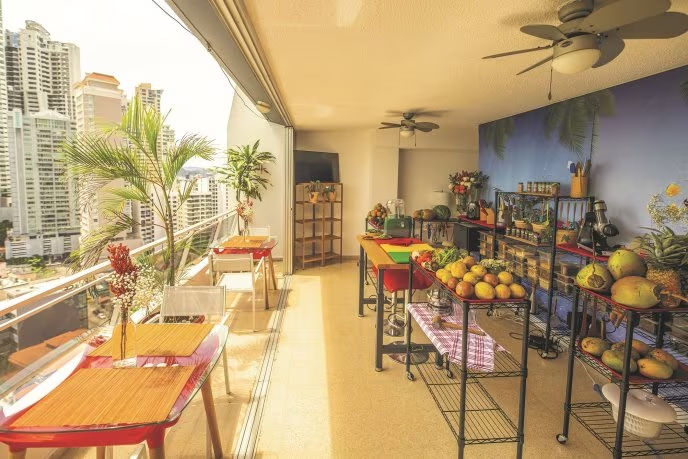
One of three of the Sunfired Culinary Institute’s kitchens with a view of the Bay of Panama that welcomes over 12 hours of natural sunlight.
“My philosophy is about looking at a daily cycle, the 24 hours the human body goes through. Sleeping for eight hours means we are fasting, which shuts the whole digestive system down so the body can do repair work by breaking down old cells and building new cells.”
The first eight hours of his day is the ‘breaking of the fast’ period, not breakfast, to draw out impurities. At night, we have eight hours to empty the waste bin. “What we do is supposed to facilitate that elimination. Avoid foods that tax the digestive system, instead feed the body electrical foods, basically fruits, which comprise moisture and fibre. We get the body ready for the third phase of our day – refuelling with building materials.”
Aris puts a lot of energy into passing on his wisdom. His website, sunfired. com, is bursting with colour and recipes brimming with flavour. His own Sunfired Culinary Institute offers retreats, nature expeditions and cooking courses. He also holds workshops for the local youth on the importance of a healthy diet and employment.
The central tenet to Aris’ efforts is that our main home is our body, and its building and maintenance is where we can find the energy to cherish and nourish both our family and community.
Succeed like Dr Aris
The Panama local has a clear priority list for how we should be living: “My body is my home. This temple comes first before anything else,” is his mantra.
“All human beings can agree there are three things essential for living: food, clothing, and shelter. My number one investment on the top of my shopping list is my food. If I have any money left, then I go find some clothes. And anything left after that goes into my shelter. Living here in a penthouse, or my 700-acre farm, to me means I have taken care first and foremost of my body, by investing in my food. I am eating the best way possible. Because I want to live in the most expensive body, I can build it by selecting topnotch, quality, high-vibration food.”
Interview by Paul Emmet, Photos by Mandela Gregoire
Download the Life at Home Magazine
